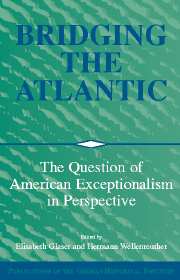Book contents
- Frontmatter
- Introduction
- Part One Transatlantic Faiths and Beliefs
- Part Two Transatlanatic Ideologies and the Perception of the Other
- Part Three People in the Transatlantic World The Perception fo Self
- Part Four Transatlantic Politics and Economics
- 9 Franklin Delano Roosevelt and Adolf Hitler: A Contemporary Comparison Revisited
- 10 The Role of the Banker in Transatlantic History: J. P. Morgan & Co. and Aid for the Allies, 1914-1916
- Part Five Transatlantic History and American Exceptionalism
- Index
9 - Franklin Delano Roosevelt and Adolf Hitler: A Contemporary Comparison Revisited
Published online by Cambridge University Press: 05 January 2013
- Frontmatter
- Introduction
- Part One Transatlantic Faiths and Beliefs
- Part Two Transatlanatic Ideologies and the Perception of the Other
- Part Three People in the Transatlantic World The Perception fo Self
- Part Four Transatlantic Politics and Economics
- 9 Franklin Delano Roosevelt and Adolf Hitler: A Contemporary Comparison Revisited
- 10 The Role of the Banker in Transatlantic History: J. P. Morgan & Co. and Aid for the Allies, 1914-1916
- Part Five Transatlantic History and American Exceptionalism
- Index
Summary
Roosevelt and Hitler came to power in the same year; the former died shortly before the latter committed suicide. This contemporaneity was one of the very few things they had in common, but it did lead to one other very important shared experience, or perhaps one should say nonexperience: neither was able to write his memoirs. This has meant that neither had the opportunity to present his own version of events the way so many of their other contemporaries did; in fact, it almost invited others to present their versions in a manner that might well have been impossible had these others been obliged to consider the possibility of a rebuttal. This was to be particularly true in the case of Hitler. Dozens if not hundreds of those who had happily collected promotions, bribes, estates, and medals from him would discover after his death that they had not only been vastly more intelligent and far-sighted than the leader they had once praised so loudly and served with such devotion, but they had both despised him the whole time and had invariably given him the good advice whose disregard had led Germany to disaster.
Now that more time has passed, most of the memoir writers have departed from the scene, and much more of the record has become available, it might be of interest to look at these two leaders in terms of their own perceptions of themselves as well as their places in the great drama of the twelve years during which they led their respective countries. There is an enormous difference that immediately strikes the observer. Whereas both men had a great deal of self-confidence, there was a self-assurance about Roosevelt that Hitler entirely lacked.
- Type
- Chapter
- Information
- Bridging the AtlanticThe Question of American Exceptionalism in Perspective, pp. 211 - 222Publisher: Cambridge University PressPrint publication year: 2002



